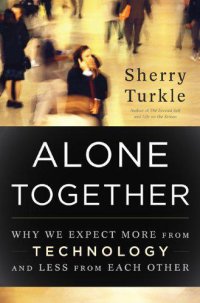
Ebook: Alone Together: Why We Expect More From Technology and Less From Each Other
Author: Turkle Sherry
- Year: 2011
- Publisher: Basic Books
- Language: English
- mobi
From Publishers Weekly
Starred Review. As the digital age sparks increasing debate about what new technologies and increased connectivity are doing to our brains, comes this chilling examination of what our iPods and iPads are doing to our relationships from MIT professor Turkle (Simulation and Its Discontents). In this third in a trilogy that explores the relationship between humans and technology, Turkle argues that people are increasingly functioning without face-to-face contact. For all the talk of convenience and connection derived from texting, e-mailing, and social networking, Turkle reaffirms that what humans still instinctively need is each other, and she encounters dissatisfaction and alienation among users: teenagers whose identities are shaped not by self-exploration but by how they are perceived by the online collective, mothers who feel texting makes communicating with their children more frequent yet less substantive, Facebook users who feel shallow status updates devalue the true intimacies of friendships. Turkle 's prescient book makes a strong case that what was meant to be a way to facilitate communications has pushed people closer to their machines and further away from each other. (Jan.)
(c) Copyright PWxyz, LLC. All rights reserved.
From
With the recent explosion of increasingly sophisticated cell-phone technology and social networking websites like Twitter and Facebook, a casual observer might understandably conclude that human relationships are blossoming like never before. But according to MIT science professor Turkle, that assumption would be sadly wrong. In the third and final volume of a trilogy dissecting the interface between humans and technology, Turkle suggests that we seem determined to give human qualities to objects and content to treat each other as things. In her university-sponsored studies surveying everything from text-message usage among teens to the use of robotic baby seals in nursing homes for companionship, Turkle paints a sobering and paradoxical portrait of human disconnectedness in the face of expanding virtual connections in cell-phone, intelligent machine, and Internet usage. Despite her reliance on research observations, Turkle emphasizes personal stories from computer gadgetrys front lines, which keeps her prose engaging and her message to the human speciesto restrain ourselves from becoming technologys willing slaves instead of its guiding mastersloud and clear. --Carl Hays